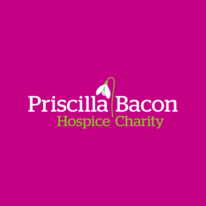“Once a trolley dolly, always a trolley dolly” – Carolyn’s story
Businesswoman, former air hostess and one-time chef to rogue entrepreneur Tiny Rowland, Carolyn Hamerton now brings her life experiences to help others – for free.
Carolyn has spent almost 20 years as a volunteer at Priscilla Bacon Lodge, the Norwich-based centre for end-of-life care, still serving others.
“Once a trolley dolly, always a trolley dolly,” she teases. But more of that later…
For now, however, despite the humour, the outsider might be forgiven for thinking perhaps the work is not for everyone.
“People ask ‘how can you work in a place where people are close to dying?’,” says Carolyn. “But the fact is most patients at the lodge come here for respite care and pain relief, and then go home to die in peace.
“It’s difficult to explain, but this is a very happy place and there is a lot of humour here, lots of smiles. You never see staff or volunteers with long faces and our patients love a good sense of humour.
“At the same time, we can help the families and relatives. The person who is ill is being treated, after all, but the families need support as well and we provide that too.”
The daughter of the late Norwich coroner James Hipwell, Carolyn was speaking as a £12.5m appeal to build a new and bigger Priscilla Bacon Hospice enters its fourth month.
Already more than £3m has been raised, but there is still a long way to go before work can start on the 24-bed unit which will serve all of Norfolk.
Carolyn, who once worked for Air Anglia before moving to London and, among other jobs, catered for senior management at House of Fraser including guests like Lonhro chief Tiny Rowland, now runs a security firm with her husband and became involved with the lodge through a friend who is among one of more than 100 lodge volunteers.
On application, potential volunteers at the lodge undergo a DBS criminal record check and must provide two references. If accepted, they receive training in the lodge’s three main areas – wards, day unit and coffee bar (“the hub of the place,” says Carolyn). They can then elect to specialise in one section or, like Carolyn, work across all three.
Working on a regular shift basis and a flexible, “come if you can when called” arrangement, her typical shift runs from 9am to 1.30pm – with a wide range of duties.
“We have lots of activities here including art, crafts, baking, flower arranging and our regular fundraising fairs,” she explains. “I also serve lunches and drinks, drive patients to hospital sometimes and help patients who have lost their hair through cancer treatment with the Headstart programme, which shows all the exciting things people can do with scarves and hats.”
Carolyn also sits with patients in the wards, chatting to them, sometimes writing letters for them, generally allowing the trained nurses time to do their specialist work. This valuable input can also have unexpected outcomes.
“I was sitting with a patient who was very restless,” says Carolyn. “We were talking and it turned out he couldn’t see very well at all. I asked if he had glasses, but he said they were no good. We tried them and, no, he couldn’t see with them.
“Now, it can’t be very pleasant if you don’t see well and there are people coming and going and peering at you while you’re in bed. Everything’s a blur.
“Anyway, I asked the nurse if an optician could come and visit. He got new glasses and he was absolutely fine. It’s just one example of how volunteers and nursing staff can help the patients.”
Of course, by the nature of the lodge, there are less happy outcomes; but, even then, positivity shines through.
“We will sit with patients to the end if the family is not able to come,” she says. “I consider it a privilege to be able to spend time with people at the time of their death. It is very levelling. You might have issues at home, but then you come here and think ‘look at these people’s problems’.”
The work is rewarding, but also emotionally tiring.
“You have to unwind,” says Carolyn. “At the end of a shift, you do have to take that moment to move from this environment into your normal life.”
A little while ago, in her role as “trolley dolly”, Carolyn combined her work as a volunteer at the lodge with a memory from her past professional life.
“I saw an unusual name on the patient list which was the same as my old airline captain,” she says. “I investigated and, yes, it was him. But each time I went to the ward, the curtains were round his bed and I couldn’t see or talk to him.
“This kept happening and, after a while, I got fed up and stood outside the curtains and piped up: ‘Coffee, tea or a drink from the bar?’ ‘I know that voice,’ he said. ‘I can’t believe this is happening.’
“I reminded him of all the times we’d shared a whisky after flights to Aberdeen with Air Anglia, and he had one. It was lovely. A couple of days later, he died, but we’d had that moment.”
– For more information about volunteering at Priscilla Bacon Lodge, contact Catherine Wilson on 01603 255719 or Catherine.Wilson@nchc.nhs.uk
Did you know?
– More than 100 volunteers help at Priscilla Bacon Lodge (PBL), contributing an average of more than 1,000 hours a month across many different roles for 352 days a year.
– The age range of volunteers is 17 to 85, with some helping at the Lodge for more than 30 years.
– There are also 75 volunteers at six Priscilla Bacon Hospice (PBH) shops across Norfolk, contributing 280 hours a week, equivalent to 1,200 hours a month or 14,560 a year.
– In the 40 years since the lodge opened, the local population has increased by one third (220,000) while the number of palliative care beds has reduced.
Who cares?
Specialist care is provided in the inpatient unit and the day unit at Priscilla Bacon Lodge, and in the wider community, by the community specialist palliative care team and the hospice at home service through a partnership with Norfolk Community Health and Care.
Other services include medical outpatients and treatment clinics with advice on pain control and management of symptoms, occupational therapy and physiotherapy, psychological support clinics, spiritual and emotional support for patients, family, friends and carers.
There are also complementary therapies, information on conditions, their treatment and any additional support available.
The centre’s multidisciplinary teams work closely together and with GPs and community nurses, as well as other health or social care professionals involved in a patient’s care.


